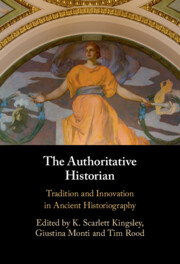Book contents
- The Authoritative Historian
- The Authoritative Historian
- Copyright page
- Dedication
- Contents
- Contributors
- Preface
- Abbreviations
- Introduction
- Part I Myth, Fiction, and the Historian’s Authority
- Part II Dislocating Authority in Herodotus’ Histories
- Chapter 5 Herodotus as Tour Guide
- Chapter 6 Interpretive Uncertainty in Herodotus’ Histories
- Chapter 7 ‘It is no accident that …’
- Chapter 8 Through Barbarian Eyes
- Part III Performing Collective and Personal Authority
- Part IV Generic Transformations
- Part V Innovation within Tradition
- Bibliography
- Index Locorum
- General Index
Chapter 6 - Interpretive Uncertainty in Herodotus’ Histories
from Part II - Dislocating Authority in Herodotus’ Histories
Published online by Cambridge University Press: 02 December 2022
- The Authoritative Historian
- The Authoritative Historian
- Copyright page
- Dedication
- Contents
- Contributors
- Preface
- Abbreviations
- Introduction
- Part I Myth, Fiction, and the Historian’s Authority
- Part II Dislocating Authority in Herodotus’ Histories
- Chapter 5 Herodotus as Tour Guide
- Chapter 6 Interpretive Uncertainty in Herodotus’ Histories
- Chapter 7 ‘It is no accident that …’
- Chapter 8 Through Barbarian Eyes
- Part III Performing Collective and Personal Authority
- Part IV Generic Transformations
- Part V Innovation within Tradition
- Bibliography
- Index Locorum
- General Index
Summary
In the treatise conventionally entitled De malignitate Herodoti, Plutarch charges Herodotus with systematic malevolence, claiming that his intent as an author was to tarnish the reputation of the great cities and individual heroes featured in his Histories. Plutarch lists eight different ways in which he thinks Herodotus deliberately presented information that would diminish reputations: that he used the harshest of descriptive adjectives, when softer ones were possible; emphasized personally discreditable gossip; omitted mention of noble deeds; sided with the worst version when two or more versions of events were available; attributed base and self-serving motives whenever possible; claimed the desire for money as a motive when it was unnecessary; used disreputable reports while claiming that he did not personally believe them; and, finally, used some weak words of praise in order to make his much stronger criticisms more convincing.1
- Type
- Chapter
- Information
- The Authoritative HistorianTradition and Innovation in Ancient Historiography, pp. 121 - 138Publisher: Cambridge University PressPrint publication year: 2023

